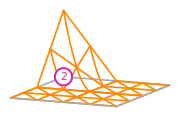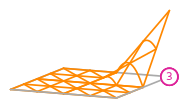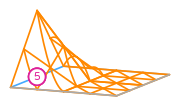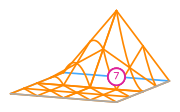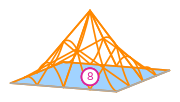an encyclopedia of finite element definitions
Degree 1 P1-iso-P2 on a quadrilateral
◀ Back to P1-iso-P2 definition page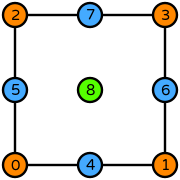
- \(R\) is the reference quadrilateral. The following numbering of the subentities of the reference is used:
- \(\mathcal{V}\) is spanned by: \(\begin{cases} 4 x y - 2 x - 2 y + 1&\text{in }\operatorname{Quadrilateral}(((0, 0), (1/2, 0), (0, 1/2), (1/2, 1/2)))\\0&\text{in }\operatorname{Quadrilateral}(((1/2, 0), (1, 0), (1/2, 1/2), (1, 1/2)))\\0&\text{in }\operatorname{Quadrilateral}(((0, 1/2), (1/2, 1/2), (0, 1), (1/2, 1)))\\0&\text{in }\operatorname{Quadrilateral}(((1/2, 1/2), (1, 1/2), (1/2, 1), (1, 1)))\end{cases}\), \(\begin{cases} 0&\text{in }\operatorname{Quadrilateral}(((0, 0), (1/2, 0), (0, 1/2), (1/2, 1/2)))\\- 4 x y + 2 x + 2 y - 1&\text{in }\operatorname{Quadrilateral}(((1/2, 0), (1, 0), (1/2, 1/2), (1, 1/2)))\\0&\text{in }\operatorname{Quadrilateral}(((0, 1/2), (1/2, 1/2), (0, 1), (1/2, 1)))\\0&\text{in }\operatorname{Quadrilateral}(((1/2, 1/2), (1, 1/2), (1/2, 1), (1, 1)))\end{cases}\), \(\begin{cases} 0&\text{in }\operatorname{Quadrilateral}(((0, 0), (1/2, 0), (0, 1/2), (1/2, 1/2)))\\0&\text{in }\operatorname{Quadrilateral}(((1/2, 0), (1, 0), (1/2, 1/2), (1, 1/2)))\\- 4 x y + 2 x + 2 y - 1&\text{in }\operatorname{Quadrilateral}(((0, 1/2), (1/2, 1/2), (0, 1), (1/2, 1)))\\0&\text{in }\operatorname{Quadrilateral}(((1/2, 1/2), (1, 1/2), (1/2, 1), (1, 1)))\end{cases}\), \(\begin{cases} 0&\text{in }\operatorname{Quadrilateral}(((0, 0), (1/2, 0), (0, 1/2), (1/2, 1/2)))\\0&\text{in }\operatorname{Quadrilateral}(((1/2, 0), (1, 0), (1/2, 1/2), (1, 1/2)))\\0&\text{in }\operatorname{Quadrilateral}(((0, 1/2), (1/2, 1/2), (0, 1), (1/2, 1)))\\4 x y - 2 x - 2 y + 1&\text{in }\operatorname{Quadrilateral}(((1/2, 1/2), (1, 1/2), (1/2, 1), (1, 1)))\end{cases}\), \(\begin{cases} 2 x \left(1 - 2 y\right)&\text{in }\operatorname{Quadrilateral}(((0, 0), (1/2, 0), (0, 1/2), (1/2, 1/2)))\\4 x y - 2 x - 4 y + 2&\text{in }\operatorname{Quadrilateral}(((1/2, 0), (1, 0), (1/2, 1/2), (1, 1/2)))\\0&\text{in }\operatorname{Quadrilateral}(((0, 1/2), (1/2, 1/2), (0, 1), (1/2, 1)))\\0&\text{in }\operatorname{Quadrilateral}(((1/2, 1/2), (1, 1/2), (1/2, 1), (1, 1)))\end{cases}\), \(\begin{cases} 2 y \left(1 - 2 x\right)&\text{in }\operatorname{Quadrilateral}(((0, 0), (1/2, 0), (0, 1/2), (1/2, 1/2)))\\0&\text{in }\operatorname{Quadrilateral}(((1/2, 0), (1, 0), (1/2, 1/2), (1, 1/2)))\\4 x y - 4 x - 2 y + 2&\text{in }\operatorname{Quadrilateral}(((0, 1/2), (1/2, 1/2), (0, 1), (1/2, 1)))\\0&\text{in }\operatorname{Quadrilateral}(((1/2, 1/2), (1, 1/2), (1/2, 1), (1, 1)))\end{cases}\), \(\begin{cases} 0&\text{in }\operatorname{Quadrilateral}(((0, 0), (1/2, 0), (0, 1/2), (1/2, 1/2)))\\2 y \left(2 x - 1\right)&\text{in }\operatorname{Quadrilateral}(((1/2, 0), (1, 0), (1/2, 1/2), (1, 1/2)))\\0&\text{in }\operatorname{Quadrilateral}(((0, 1/2), (1/2, 1/2), (0, 1), (1/2, 1)))\\- 4 x y + 4 x + 2 y - 2&\text{in }\operatorname{Quadrilateral}(((1/2, 1/2), (1, 1/2), (1/2, 1), (1, 1)))\end{cases}\), \(\begin{cases} 0&\text{in }\operatorname{Quadrilateral}(((0, 0), (1/2, 0), (0, 1/2), (1/2, 1/2)))\\0&\text{in }\operatorname{Quadrilateral}(((1/2, 0), (1, 0), (1/2, 1/2), (1, 1/2)))\\2 x \left(2 y - 1\right)&\text{in }\operatorname{Quadrilateral}(((0, 1/2), (1/2, 1/2), (0, 1), (1/2, 1)))\\- 4 x y + 2 x + 4 y - 2&\text{in }\operatorname{Quadrilateral}(((1/2, 1/2), (1, 1/2), (1/2, 1), (1, 1)))\end{cases}\), \(\begin{cases} 4 x y&\text{in }\operatorname{Quadrilateral}(((0, 0), (1/2, 0), (0, 1/2), (1/2, 1/2)))\\4 y \left(1 - x\right)&\text{in }\operatorname{Quadrilateral}(((1/2, 0), (1, 0), (1/2, 1/2), (1, 1/2)))\\4 x \left(1 - y\right)&\text{in }\operatorname{Quadrilateral}(((0, 1/2), (1/2, 1/2), (0, 1), (1/2, 1)))\\4 x y - 4 x - 4 y + 4&\text{in }\operatorname{Quadrilateral}(((1/2, 1/2), (1, 1/2), (1/2, 1), (1, 1)))\end{cases}\)
- \(\mathcal{L}=\{l_0,...,l_{8}\}\)
- Functionals and basis functions:

\(\displaystyle l_{0}:v\mapsto v(0,0)\)
\(\displaystyle \phi_{0} = \begin{cases} 4 x y - 2 x - 2 y + 1&\text{in }\operatorname{Quadrilateral}(((0, 0), (1/2, 0), (0, 1/2), (1/2, 1/2)))\\0&\text{in }\operatorname{Quadrilateral}(((1/2, 0), (1, 0), (1/2, 1/2), (1, 1/2)))\\0&\text{in }\operatorname{Quadrilateral}(((0, 1/2), (1/2, 1/2), (0, 1), (1/2, 1)))\\0&\text{in }\operatorname{Quadrilateral}(((1/2, 1/2), (1, 1/2), (1/2, 1), (1, 1)))\end{cases}\)
This DOF is associated with vertex 0 of the reference element.
\(\displaystyle \phi_{0} = \begin{cases} 4 x y - 2 x - 2 y + 1&\text{in }\operatorname{Quadrilateral}(((0, 0), (1/2, 0), (0, 1/2), (1/2, 1/2)))\\0&\text{in }\operatorname{Quadrilateral}(((1/2, 0), (1, 0), (1/2, 1/2), (1, 1/2)))\\0&\text{in }\operatorname{Quadrilateral}(((0, 1/2), (1/2, 1/2), (0, 1), (1/2, 1)))\\0&\text{in }\operatorname{Quadrilateral}(((1/2, 1/2), (1, 1/2), (1/2, 1), (1, 1)))\end{cases}\)
This DOF is associated with vertex 0 of the reference element.
\(\displaystyle l_{1}:v\mapsto v(1,0)\)
\(\displaystyle \phi_{1} = \begin{cases} 0&\text{in }\operatorname{Quadrilateral}(((0, 0), (1/2, 0), (0, 1/2), (1/2, 1/2)))\\- 4 x y + 2 x + 2 y - 1&\text{in }\operatorname{Quadrilateral}(((1/2, 0), (1, 0), (1/2, 1/2), (1, 1/2)))\\0&\text{in }\operatorname{Quadrilateral}(((0, 1/2), (1/2, 1/2), (0, 1), (1/2, 1)))\\0&\text{in }\operatorname{Quadrilateral}(((1/2, 1/2), (1, 1/2), (1/2, 1), (1, 1)))\end{cases}\)
This DOF is associated with vertex 1 of the reference element.
\(\displaystyle \phi_{1} = \begin{cases} 0&\text{in }\operatorname{Quadrilateral}(((0, 0), (1/2, 0), (0, 1/2), (1/2, 1/2)))\\- 4 x y + 2 x + 2 y - 1&\text{in }\operatorname{Quadrilateral}(((1/2, 0), (1, 0), (1/2, 1/2), (1, 1/2)))\\0&\text{in }\operatorname{Quadrilateral}(((0, 1/2), (1/2, 1/2), (0, 1), (1/2, 1)))\\0&\text{in }\operatorname{Quadrilateral}(((1/2, 1/2), (1, 1/2), (1/2, 1), (1, 1)))\end{cases}\)
This DOF is associated with vertex 1 of the reference element.
\(\displaystyle l_{2}:v\mapsto v(0,1)\)
\(\displaystyle \phi_{2} = \begin{cases} 0&\text{in }\operatorname{Quadrilateral}(((0, 0), (1/2, 0), (0, 1/2), (1/2, 1/2)))\\0&\text{in }\operatorname{Quadrilateral}(((1/2, 0), (1, 0), (1/2, 1/2), (1, 1/2)))\\- 4 x y + 2 x + 2 y - 1&\text{in }\operatorname{Quadrilateral}(((0, 1/2), (1/2, 1/2), (0, 1), (1/2, 1)))\\0&\text{in }\operatorname{Quadrilateral}(((1/2, 1/2), (1, 1/2), (1/2, 1), (1, 1)))\end{cases}\)
This DOF is associated with vertex 2 of the reference element.
\(\displaystyle \phi_{2} = \begin{cases} 0&\text{in }\operatorname{Quadrilateral}(((0, 0), (1/2, 0), (0, 1/2), (1/2, 1/2)))\\0&\text{in }\operatorname{Quadrilateral}(((1/2, 0), (1, 0), (1/2, 1/2), (1, 1/2)))\\- 4 x y + 2 x + 2 y - 1&\text{in }\operatorname{Quadrilateral}(((0, 1/2), (1/2, 1/2), (0, 1), (1/2, 1)))\\0&\text{in }\operatorname{Quadrilateral}(((1/2, 1/2), (1, 1/2), (1/2, 1), (1, 1)))\end{cases}\)
This DOF is associated with vertex 2 of the reference element.
\(\displaystyle l_{3}:v\mapsto v(1,1)\)
\(\displaystyle \phi_{3} = \begin{cases} 0&\text{in }\operatorname{Quadrilateral}(((0, 0), (1/2, 0), (0, 1/2), (1/2, 1/2)))\\0&\text{in }\operatorname{Quadrilateral}(((1/2, 0), (1, 0), (1/2, 1/2), (1, 1/2)))\\0&\text{in }\operatorname{Quadrilateral}(((0, 1/2), (1/2, 1/2), (0, 1), (1/2, 1)))\\4 x y - 2 x - 2 y + 1&\text{in }\operatorname{Quadrilateral}(((1/2, 1/2), (1, 1/2), (1/2, 1), (1, 1)))\end{cases}\)
This DOF is associated with vertex 3 of the reference element.
\(\displaystyle \phi_{3} = \begin{cases} 0&\text{in }\operatorname{Quadrilateral}(((0, 0), (1/2, 0), (0, 1/2), (1/2, 1/2)))\\0&\text{in }\operatorname{Quadrilateral}(((1/2, 0), (1, 0), (1/2, 1/2), (1, 1/2)))\\0&\text{in }\operatorname{Quadrilateral}(((0, 1/2), (1/2, 1/2), (0, 1), (1/2, 1)))\\4 x y - 2 x - 2 y + 1&\text{in }\operatorname{Quadrilateral}(((1/2, 1/2), (1, 1/2), (1/2, 1), (1, 1)))\end{cases}\)
This DOF is associated with vertex 3 of the reference element.
\(\displaystyle l_{4}:v\mapsto v(\tfrac{1}{2},0)\)
\(\displaystyle \phi_{4} = \begin{cases} 2 x \left(1 - 2 y\right)&\text{in }\operatorname{Quadrilateral}(((0, 0), (1/2, 0), (0, 1/2), (1/2, 1/2)))\\4 x y - 2 x - 4 y + 2&\text{in }\operatorname{Quadrilateral}(((1/2, 0), (1, 0), (1/2, 1/2), (1, 1/2)))\\0&\text{in }\operatorname{Quadrilateral}(((0, 1/2), (1/2, 1/2), (0, 1), (1/2, 1)))\\0&\text{in }\operatorname{Quadrilateral}(((1/2, 1/2), (1, 1/2), (1/2, 1), (1, 1)))\end{cases}\)
This DOF is associated with edge 0 of the reference element.
\(\displaystyle \phi_{4} = \begin{cases} 2 x \left(1 - 2 y\right)&\text{in }\operatorname{Quadrilateral}(((0, 0), (1/2, 0), (0, 1/2), (1/2, 1/2)))\\4 x y - 2 x - 4 y + 2&\text{in }\operatorname{Quadrilateral}(((1/2, 0), (1, 0), (1/2, 1/2), (1, 1/2)))\\0&\text{in }\operatorname{Quadrilateral}(((0, 1/2), (1/2, 1/2), (0, 1), (1/2, 1)))\\0&\text{in }\operatorname{Quadrilateral}(((1/2, 1/2), (1, 1/2), (1/2, 1), (1, 1)))\end{cases}\)
This DOF is associated with edge 0 of the reference element.
\(\displaystyle l_{5}:v\mapsto v(0,\tfrac{1}{2})\)
\(\displaystyle \phi_{5} = \begin{cases} 2 y \left(1 - 2 x\right)&\text{in }\operatorname{Quadrilateral}(((0, 0), (1/2, 0), (0, 1/2), (1/2, 1/2)))\\0&\text{in }\operatorname{Quadrilateral}(((1/2, 0), (1, 0), (1/2, 1/2), (1, 1/2)))\\4 x y - 4 x - 2 y + 2&\text{in }\operatorname{Quadrilateral}(((0, 1/2), (1/2, 1/2), (0, 1), (1/2, 1)))\\0&\text{in }\operatorname{Quadrilateral}(((1/2, 1/2), (1, 1/2), (1/2, 1), (1, 1)))\end{cases}\)
This DOF is associated with edge 1 of the reference element.
\(\displaystyle \phi_{5} = \begin{cases} 2 y \left(1 - 2 x\right)&\text{in }\operatorname{Quadrilateral}(((0, 0), (1/2, 0), (0, 1/2), (1/2, 1/2)))\\0&\text{in }\operatorname{Quadrilateral}(((1/2, 0), (1, 0), (1/2, 1/2), (1, 1/2)))\\4 x y - 4 x - 2 y + 2&\text{in }\operatorname{Quadrilateral}(((0, 1/2), (1/2, 1/2), (0, 1), (1/2, 1)))\\0&\text{in }\operatorname{Quadrilateral}(((1/2, 1/2), (1, 1/2), (1/2, 1), (1, 1)))\end{cases}\)
This DOF is associated with edge 1 of the reference element.
\(\displaystyle l_{6}:v\mapsto v(1,\tfrac{1}{2})\)
\(\displaystyle \phi_{6} = \begin{cases} 0&\text{in }\operatorname{Quadrilateral}(((0, 0), (1/2, 0), (0, 1/2), (1/2, 1/2)))\\2 y \left(2 x - 1\right)&\text{in }\operatorname{Quadrilateral}(((1/2, 0), (1, 0), (1/2, 1/2), (1, 1/2)))\\0&\text{in }\operatorname{Quadrilateral}(((0, 1/2), (1/2, 1/2), (0, 1), (1/2, 1)))\\- 4 x y + 4 x + 2 y - 2&\text{in }\operatorname{Quadrilateral}(((1/2, 1/2), (1, 1/2), (1/2, 1), (1, 1)))\end{cases}\)
This DOF is associated with edge 2 of the reference element.
\(\displaystyle \phi_{6} = \begin{cases} 0&\text{in }\operatorname{Quadrilateral}(((0, 0), (1/2, 0), (0, 1/2), (1/2, 1/2)))\\2 y \left(2 x - 1\right)&\text{in }\operatorname{Quadrilateral}(((1/2, 0), (1, 0), (1/2, 1/2), (1, 1/2)))\\0&\text{in }\operatorname{Quadrilateral}(((0, 1/2), (1/2, 1/2), (0, 1), (1/2, 1)))\\- 4 x y + 4 x + 2 y - 2&\text{in }\operatorname{Quadrilateral}(((1/2, 1/2), (1, 1/2), (1/2, 1), (1, 1)))\end{cases}\)
This DOF is associated with edge 2 of the reference element.
\(\displaystyle l_{7}:v\mapsto v(\tfrac{1}{2},1)\)
\(\displaystyle \phi_{7} = \begin{cases} 0&\text{in }\operatorname{Quadrilateral}(((0, 0), (1/2, 0), (0, 1/2), (1/2, 1/2)))\\0&\text{in }\operatorname{Quadrilateral}(((1/2, 0), (1, 0), (1/2, 1/2), (1, 1/2)))\\2 x \left(2 y - 1\right)&\text{in }\operatorname{Quadrilateral}(((0, 1/2), (1/2, 1/2), (0, 1), (1/2, 1)))\\- 4 x y + 2 x + 4 y - 2&\text{in }\operatorname{Quadrilateral}(((1/2, 1/2), (1, 1/2), (1/2, 1), (1, 1)))\end{cases}\)
This DOF is associated with edge 3 of the reference element.
\(\displaystyle \phi_{7} = \begin{cases} 0&\text{in }\operatorname{Quadrilateral}(((0, 0), (1/2, 0), (0, 1/2), (1/2, 1/2)))\\0&\text{in }\operatorname{Quadrilateral}(((1/2, 0), (1, 0), (1/2, 1/2), (1, 1/2)))\\2 x \left(2 y - 1\right)&\text{in }\operatorname{Quadrilateral}(((0, 1/2), (1/2, 1/2), (0, 1), (1/2, 1)))\\- 4 x y + 2 x + 4 y - 2&\text{in }\operatorname{Quadrilateral}(((1/2, 1/2), (1, 1/2), (1/2, 1), (1, 1)))\end{cases}\)
This DOF is associated with edge 3 of the reference element.
\(\displaystyle l_{8}:v\mapsto v(\tfrac{1}{2},\tfrac{1}{2})\)
\(\displaystyle \phi_{8} = \begin{cases} 4 x y&\text{in }\operatorname{Quadrilateral}(((0, 0), (1/2, 0), (0, 1/2), (1/2, 1/2)))\\4 y \left(1 - x\right)&\text{in }\operatorname{Quadrilateral}(((1/2, 0), (1, 0), (1/2, 1/2), (1, 1/2)))\\4 x \left(1 - y\right)&\text{in }\operatorname{Quadrilateral}(((0, 1/2), (1/2, 1/2), (0, 1), (1/2, 1)))\\4 x y - 4 x - 4 y + 4&\text{in }\operatorname{Quadrilateral}(((1/2, 1/2), (1, 1/2), (1/2, 1), (1, 1)))\end{cases}\)
This DOF is associated with face 0 of the reference element.
\(\displaystyle \phi_{8} = \begin{cases} 4 x y&\text{in }\operatorname{Quadrilateral}(((0, 0), (1/2, 0), (0, 1/2), (1/2, 1/2)))\\4 y \left(1 - x\right)&\text{in }\operatorname{Quadrilateral}(((1/2, 0), (1, 0), (1/2, 1/2), (1, 1/2)))\\4 x \left(1 - y\right)&\text{in }\operatorname{Quadrilateral}(((0, 1/2), (1/2, 1/2), (0, 1), (1/2, 1)))\\4 x y - 4 x - 4 y + 4&\text{in }\operatorname{Quadrilateral}(((1/2, 1/2), (1, 1/2), (1/2, 1), (1, 1)))\end{cases}\)
This DOF is associated with face 0 of the reference element.


